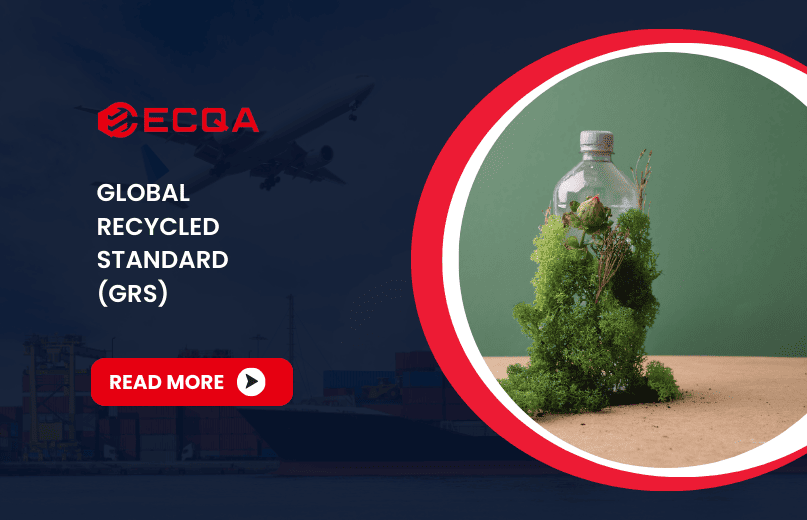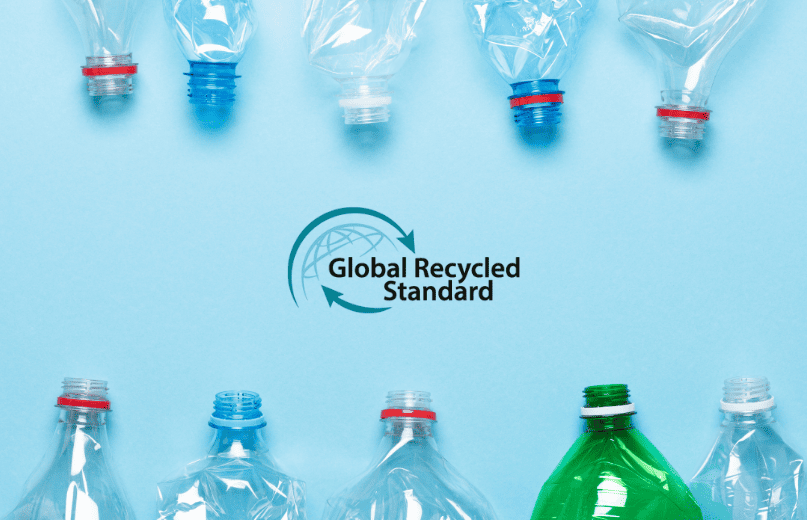
What is Global Recycled Standard (GRS)
The Global Recycled Standard (GRS) is an internationally recognized certification for products that contain recycled materials. Managed by Textile Exchange, it verifies not only the recycled content but also the social, environmental, and chemical practices applied throughout production.
Global Recycled Standard applies broadly to industries such as textiles, apparel, home furnishings, footwear, packaging, plastics, and consumer goods that include recycled input. Products must contain at least 20% recycled content to qualify, while 50% or more is required to display the GRS label. It does not extend to products made entirely from virgin materials, or to food, cosmetics, and pharmaceuticals.

Unlike single-issue certifications that stop at material verification, Global Recycled Standard provides a holistic framework. It addresses traceability, environmental responsibility, worker welfare, and chemical management, making it a trusted reference point for buyers and brands. For suppliers, manufacturers, and retailers, adopting Global Recycled Standard demonstrates a verifiable commitment to sustainability and strengthens confidence in global trade partnerships.
Key Principles of the Global Recycled Standard
The foundation of the Global Recycled Standard rests on four core pillars. Each principle ensures that certified products meet strict sustainability and ethical benchmarks.
Traceability Across the Supply Chain
Traceability is the backbone of Global Recycled Standard. Every stage of production must be documented to prove the flow of recycled content. From collection and sorting to spinning, weaving, and final product manufacturing, each step is tracked using Scope Certificates (SC) and Transaction Certificates (TC).
This system prevents false claims and protects brands from greenwashing risks. For example, a factory cannot simply label fabric as “GRS certified” unless every upstream supplier has valid certification covering that material. This chain of custody requirement gives assurance that recycled content is authentic and verifiable.
Environmental Responsibility
Global Recycled Standard mandates concrete environmental practices. Facilities are required to manage energy, water, wastewater, and solid waste responsibly. Auditors evaluate whether businesses have proper documentation, treatment systems, and continuous improvement practices.
For instance, a textile dyeing mill applying for Global Recycled Standard certification must demonstrate wastewater treatment that meets legal discharge limits. Energy and water consumption records are reviewed, and facilities are encouraged to adopt reduction targets. This environmental lens ensures that recycling is not pursued at the expense of ecological integrity.
Social Responsibility
The social component of the Global Recycled Standard aligns with key labor principles. Certified facilities must comply with internationally recognized norms on worker rights, occupational health, and safety. Forced labor, child labor, harassment, and unsafe working conditions are strictly prohibited.
This principle is critical because recycled content alone does not guarantee ethical production. Global Recycled Standard creates accountability by requiring third-party audits that assess hiring practices, wages, working hours, and grievance mechanisms. Companies that meet GRS standards can show that sustainability extends beyond materials to the people who make the products.
Chemical Restrictions
The GRS Restricted Substances List (RSL) sets strict guidelines for chemical use in certified facilities. Substances classified as toxic, carcinogenic, or environmentally hazardous are prohibited. Auditors review purchase records, chemical inventories, and on-site usage to ensure compliance.
This aspect is particularly relevant in textile finishing, dyeing, and printing, where chemical misuse can have significant health and environmental impacts. By meeting Global Recycled Standard chemical requirements, manufacturers demonstrate responsible production and safeguard both workers and end-users.
The GRS Audit: A Comprehensive Breakdown
Certification under the Global Recycled Standard requires passing a third-party audit. This process is designed to evaluate compliance with all GRS principles, from material tracking to labor rights.
The Foundation: The Scope Certificate
The Scope Certificate (SC) is the entry point into the Global Recycled Standard system. It verifies that a facility is capable of handling recycled materials in compliance with GRS requirements. Without this certificate, no company can claim GRS certification for its products.
Obtaining an SC involves an on-site audit, where the certification body examines the applicant’s processes, documentation, and capacity to manage recycled inputs. Once approved, the facility can participate in the certified supply chain.
The Audit Lifecycle: From Scope to Transaction Certificates
After the Scope Certificate, every shipment of certified goods must be accompanied by a Transaction Certificate (TC). This ensures that certified material remains traceable at each stage of production and trade.
For example, a spinning mill producing recycled yarn will issue a TC when shipping to a fabric mill. The fabric mill, in turn, requires that TC to continue the chain of custody. This process ensures that by the time a garment reaches the final brand, the recycled content can be verified back to its origin.
Key Audit Focus Areas
Auditors concentrate on four areas during certification:
- Traceability and Recycled Content Verification: Review of records, purchase documents, and production data to confirm the material flow.
- Environmental Requirements: Inspection of wastewater treatment systems, energy monitoring, and waste handling procedures.
- Social Compliance: Assessment of worker contracts, factory conditions, and interviews with employees to ensure compliance with labor standards.
- Chemical Management: Verification of chemical inventory, supplier declarations, and safe handling protocols in line with the GRS RSL.
Each component must meet minimum requirements before certification can be granted or renewed.
Common Pitfalls and How to Avoid Them
Despite the growing adoption of GRS, many companies encounter challenges during audits. Awareness of these pitfalls can save time, cost, and reputation.
Documentation Errors
Incomplete or inconsistent records remain one of the most common issues. Missing invoices, outdated supplier certificates, or misaligned transaction records can delay certification. Maintaining centralized digital documentation and regular internal reviews is essential for smooth audits.
Inadequate Material Segregation
Mixing certified and non-certified materials is a major non-conformity. Certified goods must always be stored, processed, and transported separately to maintain integrity. Simple practices like clear labeling, dedicated storage areas, and staff training help prevent contamination.
Lack of Internal Auditing
Some companies only prepare for external audits, leaving gaps in their ongoing compliance. Establishing an internal audit program ensures readiness year-round. Regular self-checks on material flow, worker conditions, and environmental records reduce the risk of last-minute failures.
Working with a GRS Certification Professional
Navigating Global Recycled Standard requirements can be complex, particularly for businesses new to international certification. Partnering with experienced certification professionals provides structure and clarity.
Certification experts guide facilities through pre-audit preparation, review documents for accuracy, and identify potential risks. They also help implement corrective actions to close compliance gaps before the formal audit.
For example, a consultant may spot weaknesses in a facility’s chemical management records and suggest corrective measures before the audit takes place. This proactive approach reduces non-conformities and streamlines the certification timeline.
Working with professionals also ensures that certification is not treated as a one-time event. Instead, companies can embed GRS practices into daily operations, creating a culture of compliance and sustainability.
The Global Recycled Standard has become a defining benchmark for recycled materials, ethical manufacturing, and transparent supply chains. Companies that adopt it gain credibility, market access, and long-term trust from business partners.
ECQA’s expert team can guide you through the entire process, from pre-audit preparation to ongoing compliance, helping you achieve and maintain GRS certification with confidence.

 Request Free Sample Report
Request Free Sample Report